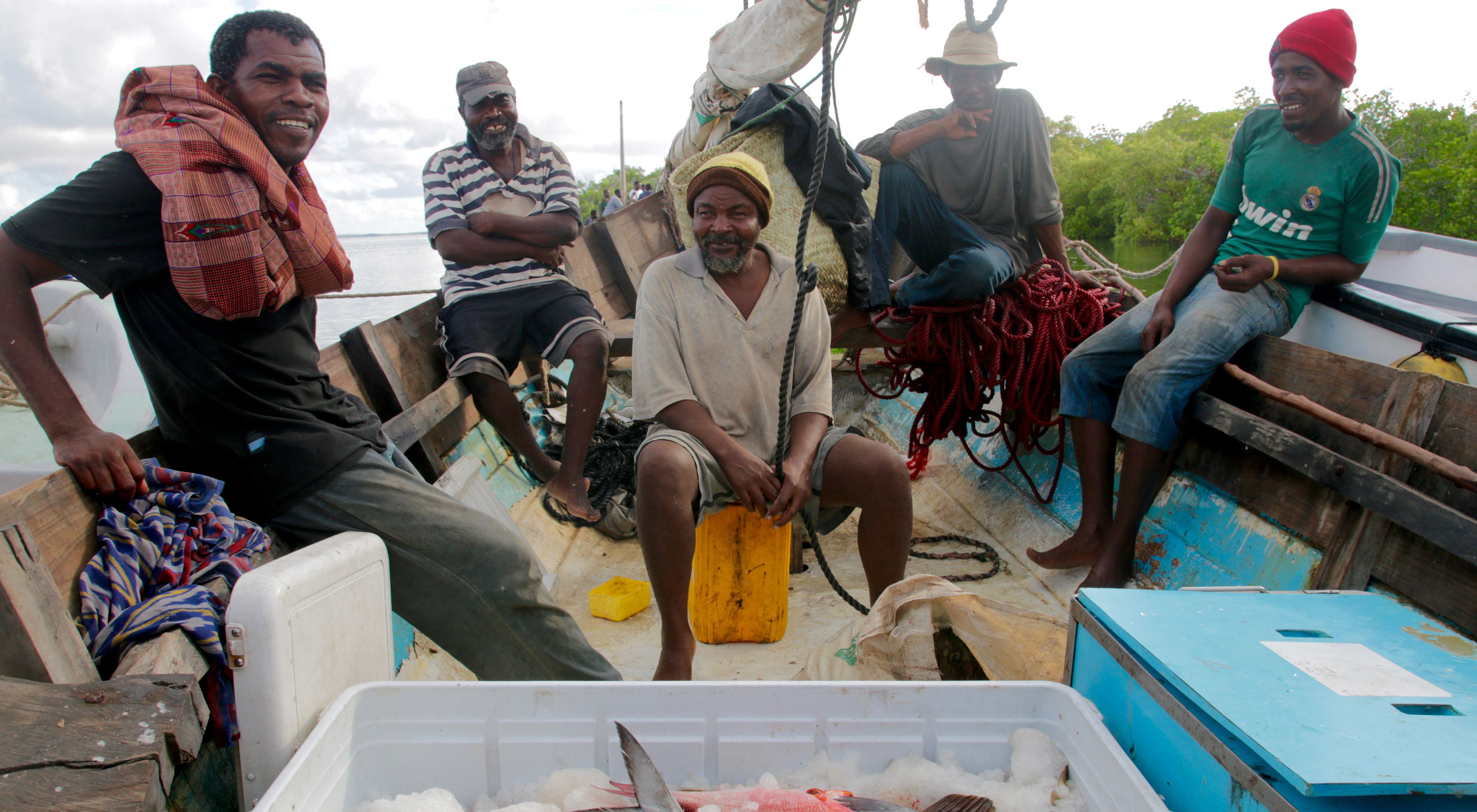
"Now we have a cool box. Such a simple thing, but you fill it with ice and your fish stay fresh, so you can stay out in the water longer. We are earning 50 percent more per kilo than before." — Ali Hassan
By Mike Pflanz
Shortly after dawn, under a cloudless sky that promised blistering heat to come, in Ali Hassan's decrepit fiberglass dhow they were weighing their catch after a night spent fishing the reef off Kenya's Indian Ocean coast. Red snapper, kingfish, mullet, and kole kole-filled sisal baskets.
It was a good haul — more than 65 kilos that would earn him and his four crew $18 each. "Better than last night," Hassan said with satisfaction as he guided his 24-foot vessel to its moorings at Faza, a village on Pate, an island in the Lamu archipelago.
This collection of islands near Kenya's border with Somalia had built a reputation as an exclusive “no news, no shoes” paradise beach bolthole for Hollywood stars, European royalty, and well-heeled tourists. The main town's 700-year-old Swahili culture made it a Unesco World Heritage Site.
But Lamu has fallen on hard times since Somali pirates kidnapped a British tourist and a Frenchwoman from islands in the archipelago in 2011, prompting Western embassies to warn against visits and robbing locals of a living in an economy that relied on tourism.
What was left was fishing. But too many boats and the effects of climate change mean that even once-rich waters here are becoming barren, risking the collapse of Lamu's key remaining industry.
Deepening poverty in an already poor area raises concerns that the radicalizing rhetoric of Islamist groups in next-door Somalia, including the Al Qaeda-allied Al Shabaab, will find increasingly fertile ground along Kenya's coast. "If you have no job, no money, and nothing to do, you are quicker to find a reason to run away to join Al Shabaab," said Atwas Shabir, a local community chairman.
The unlikely weapons to keep Lamu's fishermen in business are a simple ice cooler, a box of hooks, and a long fishing line.
The Nature Conservancy is working with partner Northern Rangelands Trust (NRT) to give as many dhows like Hassan's hooks and lines, and a cooler when they go out fishing. Kenya's government installed an ice-making machine. Electricity recently arrived on the island for the first time.
Now Hassan can spend the whole night in deep waters where larger species like red snapper gather in schools that can be sustainably fished using hooks instead of nets, which dredge waters indiscriminately. Without ice, he would be forced to stick to the over-fished inshore waters, where all that are left are juveniles and cheap smaller fish.
"The water further out is blessed with fish, but if you go there you cannot stay long because you have to come all the way back to town quickly to sell the fish before it rots," said Hassan, 56, who is married and has five children. "Now we have a cool box. Such a simple thing, but you fill it with ice and your fish stay fresh, so you can stay out in the water longer. We are earning 50 percent more per kilo than before."
Already 50 hook-and-line fishermen based from Pate Island are involved, with plans to expand the pilot program, called OceanWORKS, to more than 1,500 more soon. On shore, other members of the local community have been trained to fillet and freeze the fish, which are then sold to upscale restaurants in Kenya's booming capital, Nairobi, and to luxury safari lodges upcountry.
Fishermen like Hassan earn daily payments when they land the catch and profits from the premium sales are later fed back into community projects including education or health, and environmental protection. Other former fishermen have been retrained to work as marine conservation rangers, monitoring the health of the reef, patrolling against poachers hunting endangered turtles and policing illegal mangrove logging.
"Overfishing is not just Lamu's problem, or Kenya's, it is global and threatens our worldwide sustainability of fish stocks," said George Maina, TNC’s marine project coordinator in Kenya.
"Add to that climate change and you are already seeing major damage to reefs. The ideas that are going to work to tackle these issues are those that local communities adopt themselves and that is where we are trying to both bring Lamu's fishermen more income and provide the science to show how better practices are good environmentally but economically, too."
Kamalu Sharif, director of fisheries at the local Lamu county government, agrees that a focus on the bottom line is important.
"We know that we can't expect people to conserve the environment unless there is an economic value to doing so," he said.
Back on Hassan's boat the catch had been unloaded. Mohamed Ali, one of Hassan's crew, jumped up onto the jetty, heading for home as the sun rose higher and the heat built. He patted his pocket, where he had tucked his share of the night's earnings: "Today I will pay a school bill and give a little push to another little business of mine," he said. "But first, a shower, a cup of tea, and a rest.”
